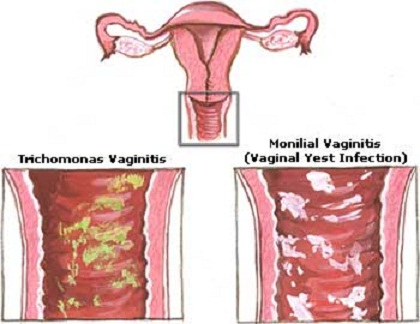Vaginal yeast infections during pregnancy are quite common, perhaps more so than at any other time during a course of a woman’s life. They are especially prevalent during the second trimester of pregnancy. However, do not be alarmed if you’re noticing an increase in white and peculiar smelling vaginal discharge as this is a common and normal symptom of pregnancy in the second trimester. Healthy discharge is thin and milky in color.

yeast infection, image: home-remedies-for-you.com
Yeast infections pose no major threat or detrimental effects on pregnancy, however they can be quite difficult to contain during pregnancy and inevitably lead to significant discomfort. If you’re wondering whether or not you’re experiencing a yeast infection, the following information may help you determine that possibility. Or if you’re fairly certain that you do have a yeast infection, seek treatment immediately.
What is a Yeast Infection?
A vaginal yeast infection (read more at womenshealth.gov) is a common fungal infection caused by an overgrowth of Candida, a naturally occurring yeast. Yeast are normally found in a woman’s vagina in small numbers, but sometimes they can multiply and change the normal balance of bacterial growth. When the fungi begin to grow in excess, they may develop into candidiasis.
Even if you’ve never had a yeast infection prior to your pregnancy, there’s a good chance you’ll develop or experience one during your pregnancy. This is due to changes in the level of acidity in the vagina, causing an imbalance which promotes an overgrowth of yeast. Although yeast are always present in the body, pregnancy lends it the opportunity to grow beyond what it’s supposed to.
Symptoms of Yeast Infection
The symptoms of a yeast infection include:
• Vaginal itching
• Burning while urinating
• Pain during intercourse
• Swollen or red vulva
• Thick, white discharge resembling cottage cheese
If you’re experiencing one or more symptoms stated above, you’re more than likely to have developed a yeast infection. Don’t delay and get yourself treated immediately, it may take 10-14 days to find relief or completely clear up the infection while you are pregnant.
What Causes Yeast Infections?
As previously mentioned, vaginal yeast infection is caused by the fungus Candida. Candida is a micro-organism that’s normally present in your vagina, along with bacteria. Your vagina naturally contains a balanced mix of yeast and bacteria.
Pregnancy, among others, can naturally upset the balance of your vagina’s pH and increase a woman’s progesterone level, thereby creating an environment where yeast thrive in.
In addition, a yeast infection can also be caused by the following:
• Taking hormones or birth control pills
• Taking antibiotics, or steroids
• High blood sugar, as in diabetes
• Vaginal intercourse
• Douching
Why are Yeast Infections Prevalent During Pregnancy?
When a woman is pregnant, her body goes through a lot of changes. Oftentimes her body experiences difficulties in coping with the chemical changes in the vaginal environment. For example, there is more sugar in the vaginal secretions on which the yeast can feed on, causing an imbalance, which results in too much fungus and subsequently; yeast infection.
In addition, pregnant women are slightly immune-compromised, which allows their body to tolerate the presence of the fetus but may also make it more vulnerable to infection.
Treatments During Pregnancy
treatment during pregnancy
During pregnancy physicians recommend vaginal creams and suppositories only. The oral medication, Diflucan (a single-dose medication), has not been proven safe during pregnancy and lactation. If left untreated, yeast infections can pass to your baby’s mouth during delivery. This is called “thrush” and is effectively treated with Nystatin.
Also, some women eat plain, unsweetened yogurt to prevent yeast infections because its live cultures may help balance the vagina’s pH level. Avoid flavored or sweetened yogurt as they may add extra sugar to your body, a favorite fuel for yeast. If nothing else, yogurt offers a calcium boost for you and your baby.
Related post: Chlamydia during pregnancy



 Saving...
Saving...